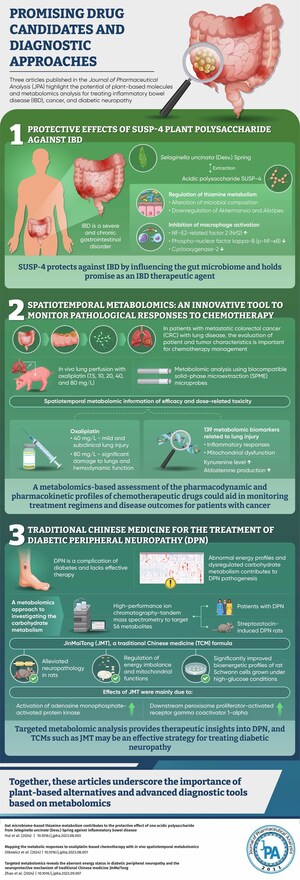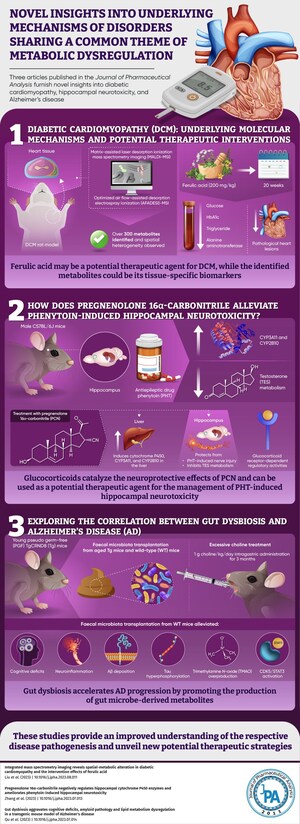New Study in Journal of Pharmaceutical Analysis Marries Modern Science with Traditional Knowledge to Decipher Anti-Diarrheal Effect of Cashew Stem Bark Extract
XI'AN, China, Feb. 24, 2022 /PRNewswire/ -- Anacardium occidentale (Ao), the common cashew tree, is a plant that has long been recognized in traditional medicine systems for its therapeutic potential. For instance, different parts of this tropical tree, leaves, bark, seed kernel, and gum, are known to have an anti-diarrheal effect. However, the exact mechanisms of action remain a mystery.
Dr. Kayode E. Adewole from the University of Medical Sciences, Nigeria, and colleagues attempted to demystify the mechanisms by investigating the anti-diarrheal activity of the stem bark extract of cashew trees. Their promising observations have recently been published in Journal of Pharmaceutical Analysis.
Caused by various factors such as food intolerance, microbial infections, drugs, and intestinal disorders, diarrhea is a major public health concern, and accounts for significant pediatric fatality. Usually, the disease manifests as increased gut motility. To explore the anti-diarrheal mechanism of cashew stem bark extract, the researchers focused on the cellular pathways and key molecular players involved in abnormal gut motility and designed a series of lab-based experiments.
Dr. Adewole explains, "Diarrhea results from increased smooth muscle activity of the intestine, which is typically controlled by three neurophysiological pathways, dopaminergic, cholinergic, and serotonergic. Therefore, our experimental approach was to artificially stimulate gastric motility through each of these pathways and then see which of these were inhibited by the cashew stem bark extract. Our experiments were divided into two parts, in vivo, conducted in live mice, and in vitro, conducted on intestinal cells."
The team administered gastrointestinal motility-inducing drugs, namely metoclopramide (a dopamine receptor antagonist), carbachol (an acetylcholine receptor agonist), and serotonin (which stimulates serotonergic receptors), to separate groups of mice. Three other groups received the same medications but were pretreated with cashew stem bark extract.
They found that a prepared ethyl acetate fraction of the extract (labelled AoEF) most significantly inhibited the cholinergic pathway of gastric emptying and gastrointestinal transit but had no effect on the other two pathways, giving a better insight into the extract's mechanism of action.
As part of the in vitro experiments, the researchers isolated strips from the intestine of guinea pigs and found that at a higher concentration, AoEF efficiently and reversibly relaxed these strips. This was seen even in strips that were pre-treated with AoEF and then treated with prokinetic molecules like histamine, serotonin, and acetylcholine.
Further, using gas chromatography-mass spectroscopy, the team identified 24 components present in AoEF. Bioinformatics-based studies revealed that among these compounds, octadecanoic acid 2-(2-hydroxylethoxy)ethyl ester had the highest binding affinity to muscarinic acetylcholine receptor M3 (CHRM3). This allowed the team to piece together evidence from all the different experiments and arrive at a possible mode of action of the extract.
"CHRM3 is a receptor involved in cholinergic signaling in smooth muscle tissues of the gastrointestinal tract, and is involved in the pathogenesis of diarrhea," Dr. Adewole tells us. "So, we concluded that AoEF relaxed and reduced gastrointestinal motility by blocking the muscarinic (or cholinergic) receptors responsible for the same."
Amalgamating the power of traditional knowledge and modern science, Dr. Adewole and his team are hoping their discovery will encourage the formulation of new low-cost remedies for treating and managing diarrhea.
Reference
Title of original paper: Evaluation of the gastrointestinal anti-motility effect of Anacardium occidentale stem bark extract: A mechanistic study of antidiarrheal activity
Journal: Journal of Pharmaceutical Analysis
DOI: https://doi.org/10.1016/j.jpha.2020.06.009
Contact:
Fen Qiu
+86-131-5206-8068
[email protected]
SOURCE Journal of Pharmaceutical Analysis

WANT YOUR COMPANY'S NEWS FEATURED ON PRNEWSWIRE.COM?
Newsrooms &
Influencers
Digital Media
Outlets
Journalists
Opted In






Share this article